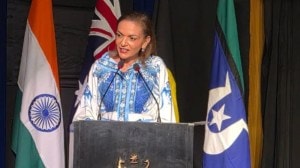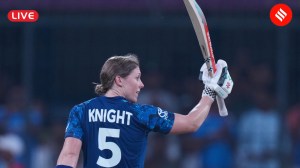What exactly happened during the Chinese Swimming Nationals, ground zero of the latest doping scandal?
After 23 Chinese swimmers let off despite testing positive for dope, American and other Western countries cry foul; WADA calls charges 'outrageous' and 'politically motivated'
 On Thursday, WADA led by president Witold Banka asked an 'independent prosecutor to review its handling of the case where 23 Chinese swimmers tested positive for a prescription heart drug'. (WADA)
On Thursday, WADA led by president Witold Banka asked an 'independent prosecutor to review its handling of the case where 23 Chinese swimmers tested positive for a prescription heart drug'. (WADA)In early 2022, 14-year-old Russian figure skater Kamila Valieva tested positive for trimetazidine (TMZ), a performance-enhancing drug that improves physical efficiency, especially in the case of endurance sports. She was handed a four-year suspension.
Before her, Chinese swimmer Sun Yang was found guilty of consuming the same drug. The World Anti-Doping Agency (WADA) slapped him with a three-month ban.
In early 2021, 23 Chinese swimmers tested positive for TMZ. No action was taken against them. Three of them went on to win gold medals at the Tokyo Olympics later that year.
The case became public earlier this week following an investigation by Germany-based ARD and The New York Times. In the aftermath, the spotlight has fallen on both, China’s anti-doping agency Chinada and WADA, for letting the accused swimmers go without any punishment for an alleged anti-doping rule violation.
Led by the US, there have been claims of a cover-up, and calls for an overhaul of the world anti-doping watchdog.
On Thursday, WADA asked an ‘independent prosecutor to review its handling of the case where 23 Chinese swimmers tested positive for a prescription heart drug’, as per AFP.
What happened in the case involving Chinese swimmers?
According to WADA, more than 200 swimmers were competing in the Chinese National Championships roughly six months before the Tokyo Olympics. They were staying in at least two different hotels when Chinada conducted dope tests on them. The swimmers who tested positive for TMZ were all at one hotel.
Almost immediately, the Chinese Ministry of Public Security investigated the incident and found traces of TMZ in a kitchen of the hotel, the extraction unit above the hall and drainage units. As per Reuters, ‘there was no explanation for how the TMZ found its way into the hotel.’ Based on this finding, Chinada concluded the positive tests were the result of accidental contamination. The Chinese swimmers were cleared without any public announcement.
The way the whole anti-doping community is working together is truly inspirational. It really is a case of One Mission, One Team. #OnePlayTrueTeam
Join us in building the world's biggest team playing for #cleansport on #PlayTrueDay! #PlayTrue @wada_ama pic.twitter.com/RMV4oOhvrO
— Witold Bańka (@WitoldBanka) April 19, 2024
Could WADA have challenged the Chinese agency’s findings?
Yes. In 2016, when Indian wrestler Narsingh Yadav failed a dope test, the Delhi-based National Anti-Doping Agency, following an internal investigation, declared his food was contaminated and exonerated him. However, days before the Olympics, WADA appealed against the Indian body’s decision and, in a case filed with the Court of Arbitration for Sport, got Narsingh banned for four years.
Why didn’t WADA appeal against Chinada’s decision?
WADA said they couldn’t send people on the ground to investigate the issue because of the strict Covid lockdown, in which China had virtually stopped entry for foreigners. So they had to depend on the updates they received from their Chinese counterparts.
The world body also claimed they procured the case file and conducted their own study, analysing the scientific and legal sides of the matter. Ultimately, WADA said they determined there was no evidence of misconduct or manipulation in the investigation carried out by Chinada.
How have other countries responded to this?
The US has been most vocal, accusing China and WADA of a cover-up. Travis Tygart, the head of USA’s anti-doping agency, said the violation should have been ‘announced’ and the athletes provisionally suspended. Unlike the normal course of justice, in anti-doping cases an accused is guilty until proven innocent. Hence, as per anti-doping rules, an athlete has to be provisionally suspended following an adverse analytical finding. Only then the rest of the steps, including finding the cause of the positive test, follow.
The New York Times also reported that the White House has called for an inquiry into the incident. The Australian agency, too, has called for an independent investigation.
Three-time Olympic gold medallist from Britain, Adam Peaty wrote on X: “Why not release this information at the time, who really benefits from the lack of transparency and secrecy? So disappointing from WADA.”
The Canadian Olympic Committee, too, called the reports “concerning”.
Has WADA defended these claims?
The world body said Tygart’s statement was ‘outrageous, completely false and defamatory’ and added it was ‘politically motivated’. WADA added that a number of US athletes, too, have been let off in a similar manner in the past, while threatening legal action.



- 01
- 02
- 03
- 04
- 05




























